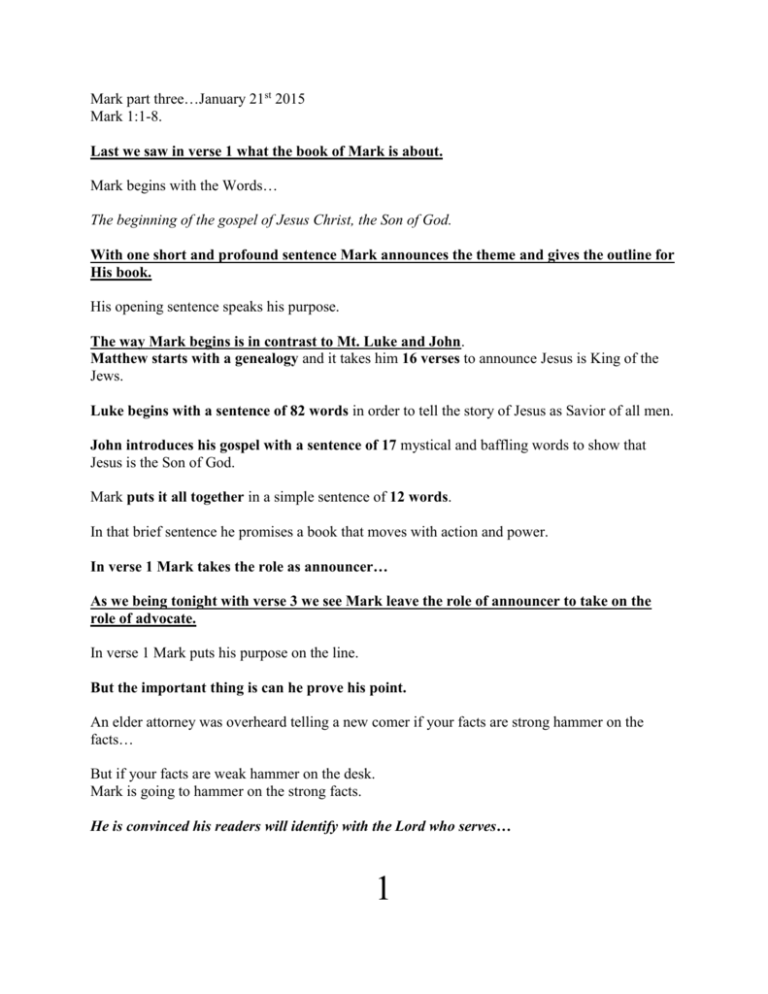Mark Part 3 - Tree of Life Ministries
advertisement

Mark part three…January 21st 2015 Mark 1:1-8. Last we saw in verse 1 what the book of Mark is about. Mark begins with the Words… The beginning of the gospel of Jesus Christ, the Son of God. With one short and profound sentence Mark announces the theme and gives the outline for His book. His opening sentence speaks his purpose. The way Mark begins is in contrast to Mt. Luke and John. Matthew starts with a genealogy and it takes him 16 verses to announce Jesus is King of the Jews. Luke begins with a sentence of 82 words in order to tell the story of Jesus as Savior of all men. John introduces his gospel with a sentence of 17 mystical and baffling words to show that Jesus is the Son of God. Mark puts it all together in a simple sentence of 12 words. In that brief sentence he promises a book that moves with action and power. In verse 1 Mark takes the role as announcer… As we being tonight with verse 3 we see Mark leave the role of announcer to take on the role of advocate. In verse 1 Mark puts his purpose on the line. But the important thing is can he prove his point. An elder attorney was overheard telling a new comer if your facts are strong hammer on the facts… But if your facts are weak hammer on the desk. Mark is going to hammer on the strong facts. He is convinced his readers will identify with the Lord who serves… 1 Identify with the Lord who suffered… Identify with the Lord who saves… And receive power from the Lord who lives. Mark will present three character witnesses to prove his case. John the Baptist…God the Father and satan. These character witnesses will leave no doubt that Jesus has the credentials to begin His ministry as the Servant Lord. As the transition between the prologue and his text Mark quotes from the prophecies of Malachi and Isaiah. He does this as a historical connector with the coming of John the Baptist who will introduce Jesus Christ. He says as it is written in the Prophets. In verse 2 and 3 we have a quote. In the verse 2 the quote comes from Malachi 3:1. In verse 3 the quote comes from Isaiah 40:3. These prophecies go together perfectly and they refer to the same person. Malachi is the introductory one and Isaiah is the more important one. We need to look at each of them to understand what Mark is writing and why he uses them. Malachi 3:1 says…Behold I send My messenger and he will prepare the way for Me. Messenger and Prophet is the same thing by the way. Then in Isaiah 40: 3 we read the voice of one crying in the wilderness; prepare the way of the Lord make straight in the desert a highway for our God. I want you to notice these prophecies are not so much focused on the King. They are focused on the messenger of the King. A messenger for a king was also known as a herald. 2 Here again we have to remember who Mark is writing to. He writing to Gentiles, Roman Christians and Roman non Christians. Mark is not writing primarily to Jews so he doesn’t start off or load his book down with a lot of O.T. prophecies like the other writers do. And he has his reasons for that. Mark knew that if Gentiles were to look at the story of this new King and see it as a sort of authentic arrival of a new King, then they would expect there to be some kind of authoritative credible herald who would announce the arrival of the King. That’s the way it was in there time. No king ever arrived and said I am the king. Every king had a forerunner, every king had an entourage. The king always had someone go before him and prepare the way to make the people ready… And every king was appropriately introduced by someone who bore authenticity and authority to make that introduction. So Mark being consistent with the Gentile approach to how kings were announced goes to the O.T. for the only time in the beginning of his gospel… Not to find a prophecy about Jesus… But to find a prophecy about His herald. Marks point is to give authenticity to the herald or the forerunner… And again the reason for doing that is because that is culture or the structure the people in the Gentile world was used to. Mark in verse 2 identifies the messenger as someone who would be a voice crying in the wilderness. Again he is quoting from the ancient prophets and he labels this from Isaiah the Prophet. Isaiah was well known to the Gentile Christians because of his book which was centered on the arrival of the Messiah or the Servant of Jehovah as Isaiah identifies Him. 3 The Gentile readers need to know that the one who announced Jesus’ arrival is the one prophesied by the ancient Prophets. In verse 4 Mark introduces the messenger. John came baptizing in the wilderness and preaching a baptism of repentance for the remission of sins. Wilderness also means desert. This messenger is John also known as John the Baptist. Why the name John the Baptist? When you read through the N.T. you have many people with the same name. A good example is the name Mary. Each Mary is identified by another name with their name. There is Mary the mother of John Mark…. Mary Magdalene… Mary the mother of our Lord. When there are so many people with the same name you have to have some way to identify what Mary you are talking about. John was also a common name in the Hebrew as well. So the word Baptist is added to his name as a way to distinguish him. The reason the Baptist is added is because he was a person who baptized people and no one else did that. The Jews didn’t baptize they had ceremonial cleansings or washings. Actually the Jews did have one form of baptism and it was a one -time thing that they did. When a person or a proselyte came out of Gentilism and wanted to become worshipper of the true God they put that person through what was called a proselyte baptism. A proselyte baptism was an immersion in water to symbolize that they were being purified from their former life and entering in to the clean religion as it were or Judaism. 4 But it wasn’t a common thing or an occurrence that happened all the time. So that’s why John is identified as John the Baptist or the John the baptizer because baptizing was unusual. And John also preached a baptism of repentance. Again by calling him John the Baptist Mark leaves out what other writers put in about him. He leaves out John was miraculously conceived because his parents were too old and had been barren. He leaves out John was filled with the Holy Spirit from his mother’s womb… He leaves out John was a relative of Jesus. He leaves out that Jesus said John was the greatest man that ever lived up until His time. And he doesn’t tell us that John was one of the most successful preachers of all time as it has been estimated John baptized over 300,000 converts. Mark leaves all that out. But look at what he does say about John… Verse 6…He says John was clothed with camels hair and with a leather belt around his waist and he ate locusts and wild honey. All Mark is concerned about is John’s style. What’s so interesting or important about being clothed in camel’s hair? If you have in your mind that this is a camel’s hide then you have the wrong thought. This is not a camel’s hide it is camel’s hair this means camel’s hair that is woven. They would take camel’s hair and make thread out of it. And then they would weave a garment out of it. It was a rough garment and it was a hairy garment with a rough leather belt. The question is why would Mark leave out all the great things about John and instead talk about his style? 5 And another question would be what was John trying to prove by looking like that? And there is a good answer to those questions. It is found in Zech. 13th chapter. There it talks about some false prophets and it associates in verse 4 false prophets who desire to deceive putting on a hairy robe. That raises another question, why would a false prophet who wanted to deceive put on a hairy robe? The reason is a hairy robe was associated with a true prophet. When Jesus said beware of wolves who come in sheep’s clothing that refers to a false teacher dressed in wool. Again a hairy garment as opposed to something make out of linen or cotton. A hairy robe was the clothing of or the dressing of a prophet. 2nd Kings 1:8 speaks of Elijah and it says he was a hairy man. That is not talking about his chest, arms or back… It is talking about his garment. If a person wanted to be taken seriously as a prophet you wore a hairy robe and leather belt. That was the official uniform of a prophet. John was a real prophet who came in the spirit and the power of Elijah. He came with the anointing of God. Malachi 4:5 says I am going to send you Elijah the prophet John it says was come in the spirit and power of Elijah. That’s the same prophecy that came to his parents before he was ever born. That’s why he wore what he wore and lived like he did. 6 Mark also tells us what John ate. This is starting to sound like face book isn’t it? And he ate locusts and wild honey. According to Lev. 11:22 locusts was the only insect you could eat. Locusts is said to have good protein and is supposed to be a good source of minerals. If you decide when they come back in a few years that you want to eat a mess of them this is how to prepare them… First you pull off the wings and then you pull off the legs and then you roast the body or boil it and grind it up and bake it in your bread with salt and it will provide protein. And wild honey was just plain good tasting and sweet to eat. Now after hearing about his style it is important to what it means… John did not want to identify with the people he wanted to identify with a prophet. Now let’s look at his message… Verse 7… and he preached, saying there comes One after me who is mightier than I, whose sandal strap I am not worthy to stoop down and loose. John was a judgment preacher and he preached that judgment was coming. And he preached a baptism of repentance for the forgiveness of sins. In ancient times the envoy of the arriving king would go before him, they would remove all the obstacles in the path and sometimes they would carve a path or even build a road or a bridge. In other words they removed any obstacle in the way of the king and they would make sure the people were ready to receive the king. For the arrival of Jesus the people would need a baptism of repentance of sins. In order to have their sins forgiven they needed to repent of them. To demonstrate their repentance they would be baptized. The baptism didn’t bring forgiveness of sin it only declared their intention. 7 Because everyone wanted to be a part of the Messiah’s kingdom no one wanted to be left out. Verse 5 tells us… then all the land of Judea and those from Jerusalem went out to him and were baptized. Wow that most have been awesome it looked like huge crusade… But the thing was when it is all said and done there was only 120 true believers in the upper room. Now here’s another question…why did he baptize in the wilderness and the Jordan River? Israel long before had been separated from Egypt by a pilgrimage through the Red Sea, the nation was once again exhorted to exercise separation. In other words the people of God are called to a second exodus in preparation for a new covenant with God. When the people heeded John’s call and went to him in the desert far more is involved than confession and repentance. It meant they returned to a place of judgment where the status of Israel as God’s beloved Son must be reestablished in exchange of pride and humility. The willingness to return to the wilderness signifies the acknowledgment of Israel’s history as one of disobedience and rebellion and a desire to start all over again. Verse 7 says and he preached saying there comes One after me who is mightier than I who sandal strap I am not worthy to stoop down and loose. I indeed baptized you with water but He will baptize you with the Holy Spirit. To undo a person’s sandal strap was the lowest position a person could have. John said he was below the people who did that. What’s the meaning of his words? John is saying all he can do is put someone in the water… But what Jesus would do or now does is transforms on the inside. This refers to the sole transforming work of salvation or being born of the water and the Spirit. 8 John is speaking of purification, cleansing, transformation, regeneration, and new birth that only the Holy Spirit can bring into a person’s life. 9








